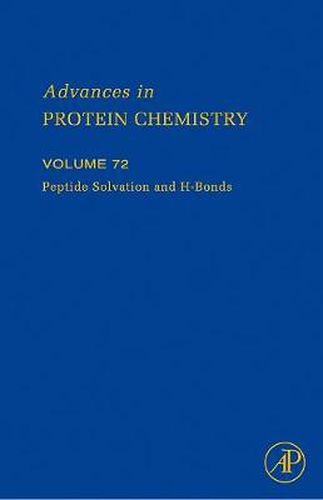Readings Newsletter
Become a Readings Member to make your shopping experience even easier.
Sign in or sign up for free!
You’re not far away from qualifying for FREE standard shipping within Australia
You’ve qualified for FREE standard shipping within Australia
The cart is loading…






Preface: New Directions in the Study of Peptide H-bonds and Peptide Solv ation 1. Potential Functions for Hydrogen Bonds in Protein Structure Prediction and Design 2. Backbone-Backbone H-Bond s Make Context Dependent Contributions to Protein Folding Kinetics and T hermodynamics: Lessons from Amide-to-Ester Mutations 3. Mod eling Polarization in Proteins and Protein-Ligand Complexes: Methods and Preliminary Results 4. Hydrogen Bonds in Molecular Mechani cs Force Fields 5. Resonance Character of Hydrogen-Bonding Interactions in Water and Other H-Bonded Species 6. How Hyd rogen Bonds Shape Membrane Protein Structure 7. Peptide and Protein Folding and Conformational Equilibria: Theoretical Treatment of Electrostatics and Hydrogen Bonding with Implicit Solvent Models 8. Thermodynamics of alpha-Helix Formation 9. The Im portance of Cooperative Interactions and A Solid State Paradigm to Prote ins
What Peptide Chemists Can Learn from Molecular Crystals
$9.00 standard shipping within Australia
FREE standard shipping within Australia for orders over $100.00
Express & International shipping calculated at checkout
Preface: New Directions in the Study of Peptide H-bonds and Peptide Solv ation 1. Potential Functions for Hydrogen Bonds in Protein Structure Prediction and Design 2. Backbone-Backbone H-Bond s Make Context Dependent Contributions to Protein Folding Kinetics and T hermodynamics: Lessons from Amide-to-Ester Mutations 3. Mod eling Polarization in Proteins and Protein-Ligand Complexes: Methods and Preliminary Results 4. Hydrogen Bonds in Molecular Mechani cs Force Fields 5. Resonance Character of Hydrogen-Bonding Interactions in Water and Other H-Bonded Species 6. How Hyd rogen Bonds Shape Membrane Protein Structure 7. Peptide and Protein Folding and Conformational Equilibria: Theoretical Treatment of Electrostatics and Hydrogen Bonding with Implicit Solvent Models 8. Thermodynamics of alpha-Helix Formation 9. The Im portance of Cooperative Interactions and A Solid State Paradigm to Prote ins
What Peptide Chemists Can Learn from Molecular Crystals